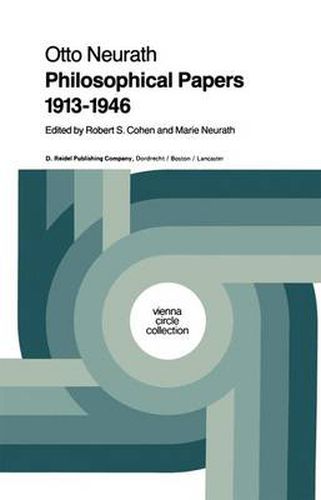Readings Newsletter
Become a Readings Member to make your shopping experience even easier.
Sign in or sign up for free!
You’re not far away from qualifying for FREE standard shipping within Australia
You’ve qualified for FREE standard shipping within Australia
The cart is loading…






This title is printed to order. This book may have been self-published. If so, we cannot guarantee the quality of the content. In the main most books will have gone through the editing process however some may not. We therefore suggest that you be aware of this before ordering this book. If in doubt check either the author or publisher’s details as we are unable to accept any returns unless they are faulty. Please contact us if you have any questions.
The philosophical writings of Otto Neurath, and their central themes, have been described many times, by Carnap in his authobiographical essay, by Ayer and Morris and Kraft decades ago, by Haller and Hegselmann and Nemeth and others in recent years. How extraordinary Neurath’s insights were, even when they perhaps were more to be seen as conjectures, aperfus, philosophical hypotheses, tools to be taken up and used in the practical workshop of life; and how prescient he was. A few examples may be helpful: (1) Neurath’s 1912 lecture on the conceptual critique of the idea of a pleasure maximum [ON 50] substantially anticipates the development of aspects of analytical ethics in mid-century. (2) Neurath’s 1915 paper on alternative hypotheses, and systems of hypotheses, within the science of physical optics [ON 81] gives a lucid account of the historically-developed clashing theories of light, their un realized further possibilities, and the implied contingencies of theory survival in science, all within his framework that antedates not only the quite similar work of Kuhn so many years later but also of the Vienna Circle too. (3) Neurath’s subsequent paper of 1916 investigates the inadequacies of various attempts to classify systems of hypotheses [ON 82, and this volume], and sets forth a pioneering conception of the metatheoretical task of scientific philosophy.
$9.00 standard shipping within Australia
FREE standard shipping within Australia for orders over $100.00
Express & International shipping calculated at checkout
This title is printed to order. This book may have been self-published. If so, we cannot guarantee the quality of the content. In the main most books will have gone through the editing process however some may not. We therefore suggest that you be aware of this before ordering this book. If in doubt check either the author or publisher’s details as we are unable to accept any returns unless they are faulty. Please contact us if you have any questions.
The philosophical writings of Otto Neurath, and their central themes, have been described many times, by Carnap in his authobiographical essay, by Ayer and Morris and Kraft decades ago, by Haller and Hegselmann and Nemeth and others in recent years. How extraordinary Neurath’s insights were, even when they perhaps were more to be seen as conjectures, aperfus, philosophical hypotheses, tools to be taken up and used in the practical workshop of life; and how prescient he was. A few examples may be helpful: (1) Neurath’s 1912 lecture on the conceptual critique of the idea of a pleasure maximum [ON 50] substantially anticipates the development of aspects of analytical ethics in mid-century. (2) Neurath’s 1915 paper on alternative hypotheses, and systems of hypotheses, within the science of physical optics [ON 81] gives a lucid account of the historically-developed clashing theories of light, their un realized further possibilities, and the implied contingencies of theory survival in science, all within his framework that antedates not only the quite similar work of Kuhn so many years later but also of the Vienna Circle too. (3) Neurath’s subsequent paper of 1916 investigates the inadequacies of various attempts to classify systems of hypotheses [ON 82, and this volume], and sets forth a pioneering conception of the metatheoretical task of scientific philosophy.